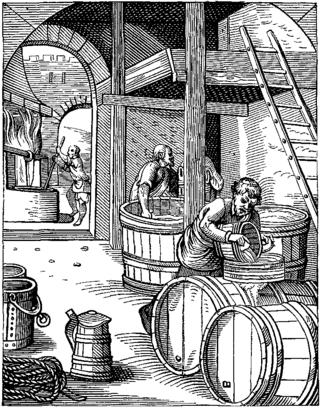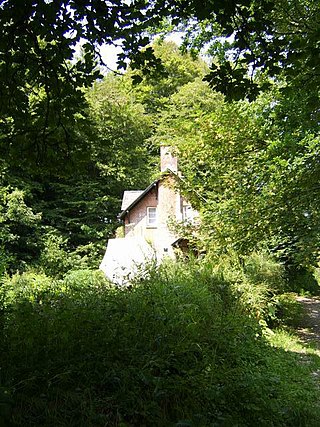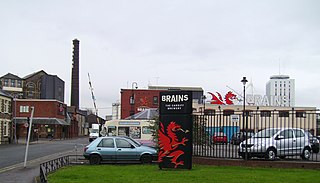Related Research Articles

Beer is an alcoholic beverage produced by the brewing and fermentation of starches from cereal grain—most commonly malted barley, although wheat, maize (corn), rice, and oats are also used. The grain is mashed to convert starch in the grain to sugars, which dissolve in water to form wort. Fermentation of the wort by yeast produces ethanol and carbonation in the beer. Beer is one of the oldest alcoholic drinks in the world, the most widely consumed, and the third most popular drink after water and tea. Most modern beer is brewed with hops, which add bitterness and other flavours and act as a natural preservative and stabilising agent. Other flavouring agents, such as gruit, herbs, or fruits, may be included or used instead of hops. In commercial brewing, natural carbonation is often replaced with forced carbonation.

Brewing is the production of beer by steeping a starch source in water and fermenting the resulting sweet liquid with yeast. It may be done in a brewery by a commercial brewer, at home by a homebrewer, or communally. Brewing has taken place since around the 6th millennium BC, and archaeological evidence suggests that emerging civilizations, including ancient Egypt, China, and Mesopotamia, brewed beer. Since the nineteenth century the brewing industry has been part of most western economies.

Stout is a type of dark beer that is generally warm fermented, such as dry stout, oatmeal stout, milk stout and imperial stout. Stout is a type of ale.

Craft beer is beer manufactured by craft breweries, which typically produce smaller amounts of beer than larger "macro" breweries and are often independently owned. Such breweries are generally perceived and marketed as emphasising enthusiasm, new flavours, and varied brewing techniques.
Richard Thomas Mabey is a writer and broadcaster, chiefly on the relations between nature and culture.

River Cottage is a brand used for a number of ventures by television chef Hugh Fearnley-Whittingstall. These include a long-running Channel 4 television series, cookery courses, events, restaurants and products such as beer and organic yogurts.

Beer was introduced to Canada by European settlers in the seventeenth century. The first commercial brewery was La Brasseries du Roy started by New France Intendant Jean Talon, in Québec City in 1668. Many commercial brewers thrived until prohibition in Canada. The provincial and federal governments' attempt to eliminate "intoxicating" beverages led to the closing of nearly three quarters of breweries between 1878 and 1928. It was only in the second half of the twentieth century that a significant number of new breweries opened up. The Canadian beer industry now plays an important role in Canadian identity, although globalization of the brewing industry has seen the major players in Canada acquired by or merged with foreign companies, notably its three largest beer producers: Labatt, Molson and Sleeman. The result is that Moosehead, with an estimated 3.8 percent share of the domestic market in 2016, has become the largest fully Canadian-owned brewer.

Beer in Wales can be traced to the 6th century. Since the 2000s, there has been a growing microbrewery industry in Wales.
Springwatch, Autumnwatch until 2022 and Winterwatch, sometimes known collectively as The Watches, are annual BBC television series which chart the fortunes of British wildlife during the changing of the seasons in the United Kingdom. The programmes are broadcast live from locations around the country in a primetime evening slot on BBC Two. They require a crew of 100 and over 50 cameras, making them the BBC's largest British outside broadcast events. Many of the cameras are hidden and operated remotely to record natural behaviour, for example, of birds in their nests and badgers outside their sett.

Beer is one of the oldest human-produced drinks. The written history of ancient Egypt and Mesopotamia records the use of beer, and the drink has spread throughout the world; a 3,900-year-old Sumerian poem honouring Ninkasi, the patron goddess of brewing, contains the oldest surviving beer-recipe, describing the production of beer from barley bread, and in China, residue on pottery dating from around 5,000 years ago shows that beer was brewed using barley and other grains.

Dame Mary Rosa Alleyne Hunnings is an English food writer, chef, baker and television presenter. After being encouraged in domestic science classes at school, she studied catering at college. She then moved to France at the age of 22 to study at Le Cordon Bleu culinary school, before working in a number of cooking-related jobs.

Tella or talla is a traditional beer from Ethiopia. It is brewed from various grains, which can change depending on location. These typically include barley or teff. Depending on region, wheat, sorghum, or corn may be used; spices can also be added. Dried and ground shiny-leaf buckthorn leaves are used for fermentation. The drink is made in a clay pot. The pot is washed with a plant called grawa. After rinsing it is smoked with weyra or Abyssinian rose. The alcohol content of tella is usually around 2–4 volume percent.

Mark Boyle, also known as The Moneyless Man, is an Irish writer best known for living without money from November 2008, and for living without modern technology since 2016. Boyle writes regularly for the British newspaper The Guardian, and has written about his experiences in a couple of books. His first book, The Moneyless Man: A Year of Freeconomic Living, was published in 2010. His fourth book, The Way Home: Tales from a life without technology, was published in 2019. Boyle lives near Loughrea, in the west of Ireland.
James Patrick Bowie Morton is a Scottish doctor, baker, author and reality television contestant, based in Glasgow, who rose to fame when he became the runner up on the third series of The Great British Bake Off.

Lion is an alcoholic beverage company that operates in Australia and New Zealand, and a subsidiary of Japanese beverage conglomerate Kirin. It produces and markets a range of beer and cider in Australia, and wine in New Zealand and the United States through Distinguished Vineyards & Wine Partners. It acts as distributors for a range of spirits in New Zealand, but does not own any distilleries outright, although holding a 50% share of Four Pillars Gin in Victoria.

Ale is a style of beer, brewed using a warm fermentation method. In medieval England, the term referred to a drink brewed without hops.

The Self-Sufficient-ish Bible: An Eco-living Guide for the 21st Century is a nonfiction book by British twins Andy and Dave Hamilton. The book was first published in 2008 by Hodder & Stoughton. The book is a guide on how to be self sufficient and have a sustainable lifestyle in the 21st century.
Jaega Wise is an English beer brewer, campaigner, broadcaster and author. Born in London and raised in Nottingham, she is the head brewer and co-founder of London-based Wild Card Brewery and in 2018 was named "Brewer of the Year" by the British Guild of Beer Writers.
The food and drink industry of Wales is the sector of the Welsh economy consisting of food and soft drink companies as well as distilleries and breweries in Wales. The food and drink sector is classed as a priority economic sector in Wales. It involves 170,000 people that contribute to gross sales of £17.3 billion.
References
- ↑ "Andy Hamilton's Author page". Amazon UK. Retrieved 25 August 2012.
- ↑ "Random House Author page" . Retrieved 25 August 2012.
- ↑ "Go foraging for your lunch: Wild food; Andy Hamilton has gained a national reputation for his foraging walks in Bristol". Bristol Post . 2 April 2011.
- ↑ Hesp, Martin (3 September 2011). "I'm just wild about free food in the hedgerows: Martin Hesp goes back to basics for the final part of his time-travelling food series on foraging". The Western Morning News.
- ↑ "Horticultural Channel Awards 2011". Archived from the original on 16 June 2012. Retrieved 25 August 2012.
{{cite web}}: CS1 maint: unfit URL (link) - ↑ "Andy Hamilton, Random House Author" . Retrieved 25 August 2012.
- ↑ "Foraging Expert shares his tips with students" (PDF). Archived from the original (PDF) on 20 May 2013. Retrieved 25 August 2012.
- ↑ "Andy Hamilton on Journalisted" . Retrieved 25 August 2012.
- ↑ "Bristol Community Radio". Archived from the original on 23 August 2012. Retrieved 25 August 2012.
- ↑ "IMDB Andy Hamilton". IMDb . Retrieved 25 August 2012.
- ↑ "BBC Autumnwatch, Making the most of Natures Larder" . Retrieved 25 August 2012.
- ↑ Hamilton, Andy (15 September 2011). Booze for Free. ISBN 9781448110520 . Retrieved 25 August 2012.
- ↑ "Andy Hamilton's Crab Apple Wine". The Guardian. London. 6 October 2011. Retrieved 25 August 2012.
- ↑ "Alan Titchmarsh Show, Autumn flower champagne" . Retrieved 25 August 2012.
- ↑ Fitzpatrick, Maria (27 September 2011). "Andy Hamilton's home-made beer". The Daily Telegraph. London. Retrieved 25 August 2012.
- ↑ "Free booze book started life in a Bath city flat". The Bath Chronicle. 1 September 2011.
- ↑ "What would happen if the plague hit the UK". Archived from the original on 22 March 2016. Retrieved 25 August 2012.
- ↑ "Andy Hamilton Guardian Profile". The Guardian. London. 9 March 2012. Retrieved 25 August 2012.
- ↑ Savill, Suzanne (10 December 2011). "Brew your own bubbly: Seasonal tipplesWhen Andy Hamilton raises a glass this Christmas, it will contain his own homemade booze". Evening Post.
- ↑ Hunt, Joanne (3 September 2011). "Why pay for your booze when you can brew it yourself?". Lincolnshire Echo.
- ↑ Wilson, John (23 May 2015). "Make your own G and T: With the right combinations of herbs, spices and alcohol, it's possible to make a passable gin and tonic". The Irish Times.